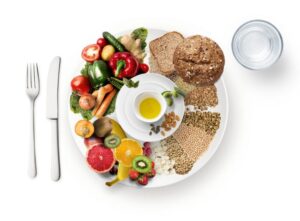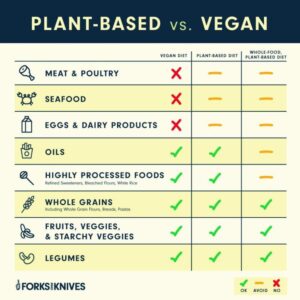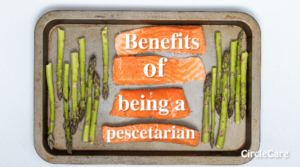Embark on a culinary journey with a nutritious diet for vegetarians, a comprehensive guide to unlocking the secrets of a healthy plant-based lifestyle. Discover the specific nutritional requirements of vegetarians and how to meet them, explore a balanced vegetarian diet with meal planning tips, and delve into the key nutrient sources for vegetarians.
This guide will dispel common misconceptions and address concerns, empowering you with evidence-based information to make informed choices. Whether you’re a seasoned vegetarian or considering adopting a plant-based diet, this guide will equip you with the knowledge and tools to thrive.
Understanding the Nutritional Needs of Vegetarians
Vegetarian diets can provide all the nutrients necessary for good health, but it is important to be aware of the specific nutritional requirements of a vegetarian diet and to take steps to ensure that you are getting enough of all the nutrients you need.Vegetarians
need to ensure they are getting enough protein, iron, calcium, and vitamin B12. Protein is essential for building and repairing tissues, and it can be found in beans, lentils, tofu, tempeh, nuts, and seeds. Iron is necessary for carrying oxygen throughout the body, and it can be found in leafy green vegetables, beans, lentils, and fortified cereals.
Calcium is important for strong bones and teeth, and it can be found in dairy products, leafy green vegetables, and fortified plant-based milks. Vitamin B12 is essential for the nervous system and blood cells, and it is found only in animal products.
Vegetarians can get vitamin B12 from fortified foods, such as cereals, plant-based milks, and nutritional yeast.
Protein
Protein is an essential nutrient for vegetarians, as it is necessary for building and repairing tissues. Good sources of protein for vegetarians include beans, lentils, tofu, tempeh, nuts, and seeds.
Iron
Iron is necessary for carrying oxygen throughout the body. Good sources of iron for vegetarians include leafy green vegetables, beans, lentils, and fortified cereals.
Calcium
Calcium is important for strong bones and teeth. Good sources of calcium for vegetarians include dairy products, leafy green vegetables, and fortified plant-based milks.
Vitamin B12
Vitamin B12 is essential for the nervous system and blood cells. Vegetarians can get vitamin B12 from fortified foods, such as cereals, plant-based milks, and nutritional yeast.
Building a Balanced Vegetarian Diet: Nutritious Diet For Vegetarian
A balanced vegetarian diet is one that provides all the nutrients the body needs for optimal health and well-being. This means including a variety of foods from all food groups, including fruits, vegetables, whole grains, legumes, nuts, and seeds. It is also important to make sure to get enough protein, iron, calcium, and vitamin B12, which are nutrients that can be more difficult to get on a vegetarian diet.
Food Groups for Vegetarians
The following food groups should be included in a vegetarian diet to ensure nutritional adequacy:
- Fruits:Fruits are a good source of vitamins, minerals, and fiber. Aim to eat at least 2 cups of fruit per day.
- Vegetables:Vegetables are a good source of vitamins, minerals, and fiber. Aim to eat at least 2.5 cups of vegetables per day.
- Whole grains:Whole grains are a good source of fiber, vitamins, and minerals. Aim to eat at least 3 servings of whole grains per day.
- Legumes:Legumes are a good source of protein, fiber, and iron. Aim to eat at least 1 cup of legumes per day.
- Nuts and seeds:Nuts and seeds are a good source of protein, healthy fats, and vitamins and minerals. Aim to eat at least 1 ounce of nuts and seeds per day.
Creating Balanced Meals
When creating balanced meals, it is important to include foods from all food groups. This will help to ensure that you are getting all the nutrients your body needs. Here are some tips for creating balanced vegetarian meals:
- Start with a base of whole grains.Whole grains are a good source of fiber, vitamins, and minerals. They can be used as the base for a variety of dishes, such as salads, soups, and stews.
- Add a variety of vegetables.Vegetables are a good source of vitamins, minerals, and fiber. They can be eaten raw, cooked, or juiced.
- Include a source of protein.Protein is essential for building and repairing tissues. Good sources of protein for vegetarians include legumes, tofu, tempeh, nuts, and seeds.
- Don’t forget healthy fats.Healthy fats are important for hormone production and cell function. Good sources of healthy fats for vegetarians include olive oil, avocados, nuts, and seeds.
Sample Meal Plans
Here are some sample meal plans that demonstrate how to incorporate a variety of nutrient-rich foods into a vegetarian diet:
- Breakfast:Oatmeal with berries and nuts, or a tofu scramble with vegetables.
- Lunch:Salad with grilled tofu, vegetables, and whole-wheat pita bread, or a lentil soup with whole-wheat bread.
- Dinner:Vegetarian chili with brown rice, or a stir-fry with vegetables and tofu.
- Snacks:Fruits, vegetables, nuts, seeds, or yogurt.
Key Nutrient Sources for Vegetarians
A vegetarian diet offers a wealth of health benefits, but it’s essential to ensure adequate intake of essential nutrients. Plant-based foods provide an array of vitamins, minerals, and antioxidants, making it possible for vegetarians to thrive on a nutrient-rich diet.
To help you navigate the nutritional landscape, here’s a comprehensive table outlining the key nutrients for vegetarians, along with their primary plant-based sources:
| Nutrient | Role in the Body | Plant-Based Sources |
|---|---|---|
| Protein | Building and repairing tissues, enzymes, and hormones | Beans, lentils, tofu, tempeh, nuts, seeds, quinoa |
| Iron | Carrying oxygen throughout the body | Leafy green vegetables, beans, lentils, fortified cereals |
| Calcium | Building and maintaining strong bones and teeth | Fortified plant milks, yogurts, leafy green vegetables, tofu |
| Vitamin B12 | Producing red blood cells and supporting the nervous system | Fortified plant milks, cereals, nutritional yeast |
| Vitamin D | Promoting bone health and immune function | Fortified plant milks, cereals, exposure to sunlight |
| Omega-3 Fatty Acids | Supporting heart and brain health | Flaxseeds, chia seeds, walnuts, algae supplements |
Optimizing your intake of these nutrients is crucial for maintaining good health as a vegetarian. Consider incorporating nutrient-rich foods into your daily meals and snacks, such as:
- A tofu scramble with leafy greens for protein and iron
- A lentil soup with whole-wheat bread for protein, iron, and fiber
- A smoothie made with fortified plant milk, berries, and nuts for protein, calcium, and antioxidants
Considerations for Specific Dietary Restrictions
Vegetarian diets can be adapted to meet various dietary restrictions, ensuring nutritional adequacy for individuals with specific needs. Let’s explore the concerns and provide guidance for vegans, gluten-free vegetarians, and vegetarians with allergies.
Vegans
Vegans exclude all animal products, including eggs, dairy, and honey. They may face challenges in meeting certain nutrient requirements, such as vitamin B12, iron, calcium, and omega-3 fatty acids. To address these concerns:
- Vitamin B12:Supplementation is essential, as B12 is primarily found in animal products.
- Iron:Good sources include fortified cereals, beans, lentils, and leafy green vegetables. Vitamin C aids iron absorption, so include citrus fruits or juices.
- Calcium:Fortified plant milks, leafy green vegetables, and tofu can provide calcium. Consider supplementing if intake is inadequate.
- Omega-3 fatty acids:Algae supplements or fortified foods can provide EPA and DHA, essential omega-3s typically found in fish.
Health Benefits of a Nutritious Vegetarian Diet
Embracing a well-planned vegetarian diet offers a plethora of health benefits that extend beyond weight management and improved cardiovascular health. Research has consistently shown that vegetarians enjoy a reduced risk of developing chronic diseases, making this dietary choice a cornerstone of optimal well-being.
Reduced Risk of Chronic Diseases
Studies have demonstrated that vegetarians have a significantly lower risk of developing certain chronic diseases, including heart disease, stroke, type 2 diabetes, and some types of cancer. This protective effect is attributed to the high intake of fruits, vegetables, and whole grains, which are rich in antioxidants, fiber, and other protective compounds.
- A study published in the American Journal of Clinical Nutrition found that vegetarians had a 24% lower risk of heart disease compared to non-vegetarians.
- Another study published in the Journal of the American Medical Association showed that vegetarians had a 34% lower risk of stroke.
Improved Cardiovascular Health
Vegetarian diets are typically low in saturated fat and cholesterol, which are major contributors to heart disease. The high intake of fruits, vegetables, and whole grains in vegetarian diets helps lower blood pressure, improve cholesterol levels, and reduce inflammation, all of which contribute to better cardiovascular health.
- A study published in the Journal of Nutrition found that vegetarians had lower levels of LDL (bad) cholesterol and higher levels of HDL (good) cholesterol compared to non-vegetarians.
- Another study published in the American Heart Journal showed that vegetarians had a 15% lower risk of developing high blood pressure.
Weight Management
Vegetarian diets are typically higher in fiber and lower in calories than non-vegetarian diets. This makes them a great option for weight management and weight loss. Fiber helps promote satiety and fullness, which can help reduce overall calorie intake.
- A study published in the International Journal of Obesity found that vegetarians had a lower body mass index (BMI) than non-vegetarians.
- Another study published in the Journal of the American Dietetic Association showed that vegetarians lost more weight than non-vegetarians over a 12-week period.
Common Misconceptions and Concerns
Adopting a vegetarian diet often sparks concerns about nutritional adequacy and social challenges. Let’s address some common misconceptions and provide evidence-based information to dispel myths and ease worries.
One major concern is protein deficiency. However, plant-based sources like beans, lentils, tofu, and quinoa provide ample protein. Vegetarian athletes and bodybuilders have proven that it’s possible to meet protein requirements through a well-planned vegetarian diet.
Vitamin B12 Inadequacy, Nutritious diet for vegetarian
Vitamin B12 is primarily found in animal products, so vegetarians must pay attention to their intake. Fortified foods like plant-based milk, cereals, and nutritional yeast can provide sufficient amounts. If needed, a vitamin B12 supplement can be considered.
Social Challenges
Social gatherings often revolve around meat-based dishes, which can pose challenges for vegetarians. However, with a bit of planning and communication, vegetarians can navigate these situations gracefully. They can bring their own vegetarian dishes to share or inquire about vegetarian options when dining out.
Calling fish “meat” is not quite accurate. According to scientific definitions , meat refers to the flesh of mammals and birds. Fish, on the other hand, are aquatic vertebrates and therefore fall into a different category. Their flesh is more accurately termed “seafood” or “fish flesh.”
This distinction is not merely semantic but also reflects the unique nutritional composition and culinary properties of fish.
Closing Notes
Adopting a nutritious vegetarian diet is a journey towards optimal health and well-being. By embracing a plant-based lifestyle, you’ll not only nourish your body but also contribute to a sustainable and compassionate world. Remember, a well-planned vegetarian diet can provide all the essential nutrients your body needs, promoting vitality and longevity.
Common Queries
Is a vegetarian diet nutritionally adequate?
Yes, a well-planned vegetarian diet can provide all the essential nutrients the body needs, including protein, iron, calcium, and vitamin B12.
What are the key nutrient sources for vegetarians?
Legumes, nuts, seeds, whole grains, and fortified plant-based milk are excellent sources of protein, iron, calcium, and vitamin B12 for vegetarians.
How can vegetarians ensure they’re getting enough vitamin B12?
Vitamin B12 is primarily found in animal products, so vegetarians should consume fortified foods, such as plant-based milk, or consider supplementation.




Leave a Comment